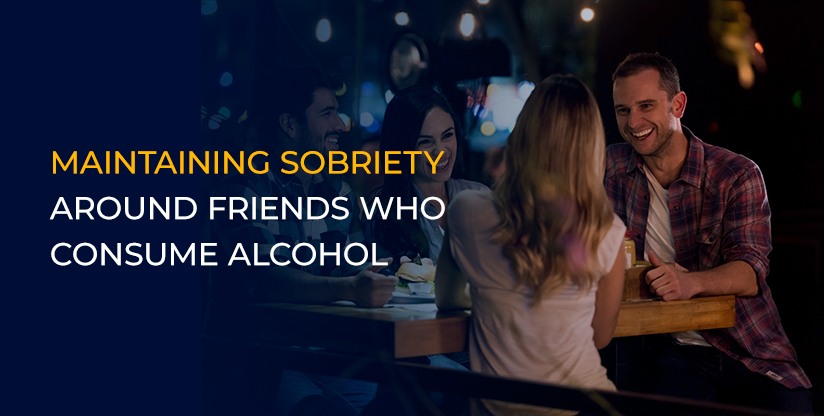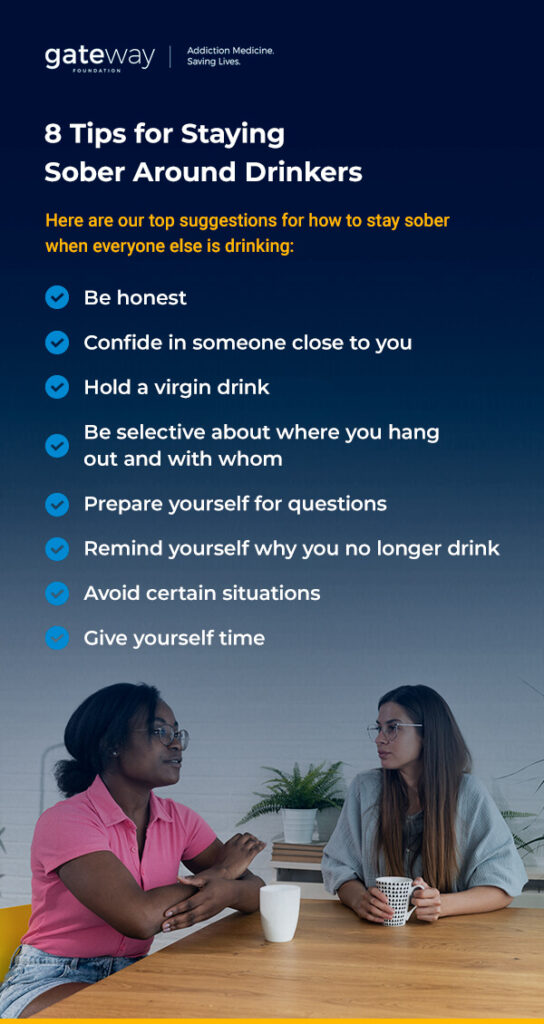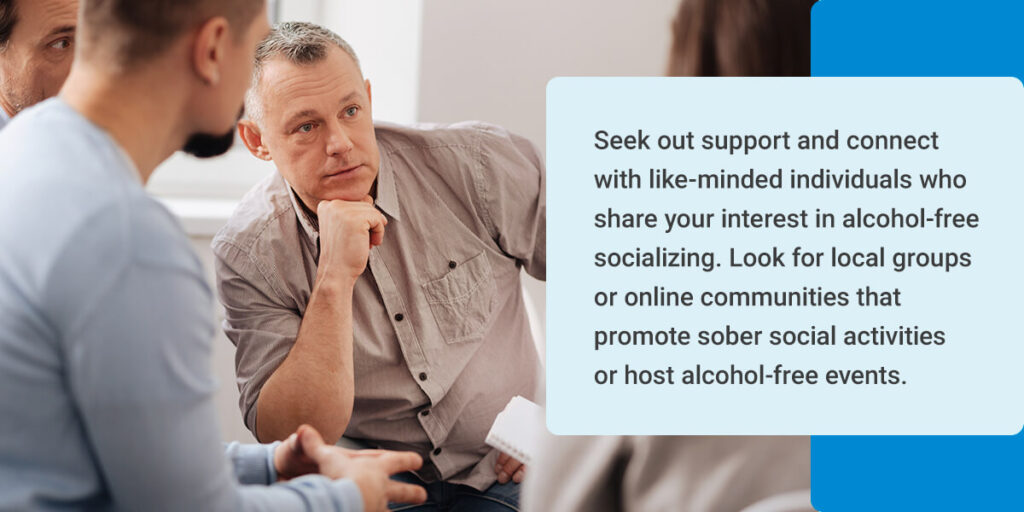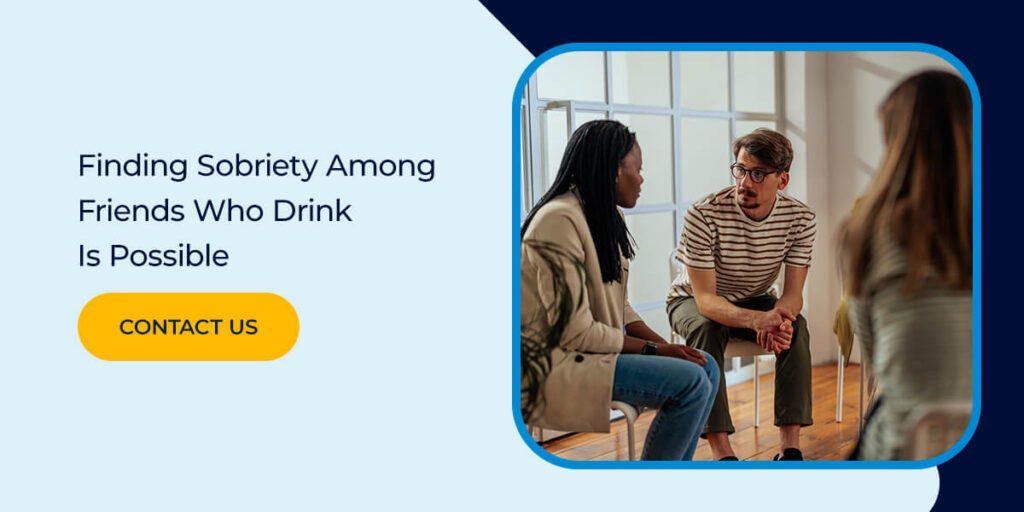- May 20
- AddictionAlcohol Addiction Treatment

As humans, we tend to surround ourselves with people who share common interests, ideas, and hobbies. We’re hard-wired to seek similarities in others because it makes us feel heard, comfortable, and safe. It goes without saying that if you used to be — or currently are — a big drinker, then your friends likely are too.
The question is — how do you quit alcohol if all your friends want to do is drink? When you decide to become sober, some friends may feel wary or suspicious of your motives or think you’re not as fun. Peer pressure surrounding drinking and sobriety can be intense. Luckily, being sober around drinkers is possible — even if they are your friends. Read on to learn how not to drink when everyone else is.
8 Tips for Staying Sober Around Drinkers

Here are our top suggestions for how to stay sober when everyone else is drinking:
- Be honest: Explain to your friends that you want to stop drinking and that sometimes, it’s hard to avoid temptation. Ask for their support — a true friend will understand.
- Confide in someone close to you: Having a supportive friend or family member to call on in challenging situations is vital. If you’re at a party and feel tempted, excuse yourself politely and call a supportive friend to pick you up or support your decision to stay sober. You could also bring a sober friend to the gathering for support if possible.
- Hold a virgin drink: Sometimes you want to attend functions with co-workers or other acquaintances involving alcohol. It can be challenging to avoid the beverage altogether. If you do find yourself in a situation where it seems as if everyone around you is drinking, try holding a virgin drink that closely resembles alcohol to avoid questioning and curious side glances. Keep your answer direct and honest if asked: “Thank you, but I’m not drinking tonight.”
- Be selective about where you hang out and with whom:Decline invitations that you know may trigger you to drink — whether it’s an activity, a time of day, a specific person, or a particular place.
- Prepare yourself for questions: Realizing that being around drinkers will initially feel awkward and challenging can make the process easier. Mentally prepare yourself for questions or comments and come up with potential responses before going to the gathering. When you’re just starting to get some momentum for your sobriety, it can help to say no and be proactive about your decision. Own it, and remember you’re in control.
- Remind yourself why you no longer drink: When faced with pressure and temptation, you may have trouble remembering why you don’t drink anymore. Try writing down your reasons in a notebook and keeping the list in your purse or wallet. You can also log notes in the notes app on your phone or in a specific sobriety-focused app where you can access them easily.
- Avoid certain situations: In treatment, you’ll identify triggers that could lead to relapse. Base your plans to hang out with drinking friends on these triggers. Try to participate in activities that are not triggering and decline invitations to activities you associate with drinking.
- Give yourself time: After completing your treatment program, it can be wise to take time to join a peer support group and focus on your recovery before spending time in situations involving alcohol. There’s no shame in waiting until your recovery is strong enough to handle temptation. Waiting can also go a long way toward you staying sober around drinkers and learning to seek help in situations where it’s not as easy.
10 Tips for Socializing Without Alcohol
Socializing without alcohol opens up a world of possibilities for genuine connections, memorable experiences, and personal growth. Embrace the opportunity to enjoy social gatherings with clarity and authenticity and celebrate the benefits of an alcohol-free lifestyle. Here’s how to socialize without alcohol:
1. Set Your Intentions
Before attending a social event, remember why you chose not to drink alcohol. Establish clear intentions and goals for the gathering, such as connecting with others, having meaningful conversations, or simply enjoying the company. Setting goals can help you get the most out of the gathering and navigate tricky situations. Have an exit strategy if needed, such as checking the nearest bus stop, pre-booking transport, or calling upon a sober friend.
2. Explore Nonalcoholic Beverages
Seek out nonalcoholic alternatives that you enjoy. Look for mocktails, alcohol-free beers or wines, herbal teas, flavored sparkling water, or creative concoctions made with juices and sodas. Having a flavorful and refreshing drink in hand can enhance your social experience. If you’re attending an event where alcohol is present, call ahead to ensure the venue has alcohol-free options.
Planning can take away the worry about what you’ll drink and the voice in your head that might tell you to “just have one.” Having “just one” can be a slippery slope, so ensuring you know what you’ll drink before you get there can help navigate this dilemma.
3. Be the Organizer
Offer to organize the day or evening’s plans. That way, you can suggest fun activities that don’t involve alcohol or ensure that where you’re going has an alcohol-free drink selection. You’ll help out your friends by relieving them of planning duties, and you can ensure the destination is somewhere you feel comfortable.
4. Engage in Meaningful Conversations
To loosen up without alcohol, focus on building genuine connections with others through conversation. Ask open-ended questions, actively listen and show a genuine interest in getting to know people. Engaging in meaningful discussions can create memorable connections that go beyond the need for alcohol to loosen up.
5. Seek Alcohol-Free Activities
Look for social events or activities that don’t revolve around alcohol. Attend concerts, art exhibitions, sporting events, or volunteer activities focusing on shared interests or experiences rather than drinking. Look for cultural festivals, fitness classes, or hobby-based groups. Exploring new and diverse activities can provide alternative avenues for socializing, creating memories, and connecting with others.
6. Surround Yourself With Supportive People
Choose to spend time with friends and acquaintances who support your decision to socialize without alcohol. Seek out individuals who appreciate and respect your choices. Being in a positive and nonjudgmental environment can make the experience more enjoyable and fulfilling.
7. Develop Coping Strategies
To stay sober when your friends are drinking, you might develop and practice coping strategies to navigate any discomfort or peer pressure. Practice assertiveness skills, such as politely declining offers of alcohol or suggesting alternative activities. If you feel uncomfortable at any point, you might leave the gathering or practice mindfulness techniques like deep breathing to keep yourself centered. Be confident in your decision, and remember that you have the right to make choices that align with your values and well-being.
8. Take Care of Yourself
Prioritize self-care during social gatherings. Pay attention to your physical and emotional needs. Get enough rest, eat nourishing food, and engage in activities that promote relaxation and well-being. Caring for yourself will help you feel more present and connected in social settings.
9. Embrace the Joys of Sobriety
Shift your perspective and embrace the joy of being sober. Focus on the positive aspects of socializing without alcohol, such as clear-mindedness, better sleep, improved health, and the ability to fully experience and remember moments with friends. Embracing sobriety can lead to a more authentic and fulfilling social life.
10. Find Support and Community

Seek support and connect with like-minded individuals who share your interest in alcohol-free socializing. Look for local groups or online communities that promote sober social activities or host alcohol-free events. Surrounding yourself with a supportive community can provide encouragement, inspiration, and a sense of belonging.
How to Find Sober Friends
Once you arm yourself with some strategies to fend off even the most persuasive drinking friends, you may have come to a point where you’re wondering how to meet sober friends. Should you pick up a different hobby or change your attitude? Sometimes, it’s just about looking in the right places. Several cities worldwide are picking up on people’s need to engage in alcohol-free activities and find a community with like-minded individuals.
Use Social Media
One way to make sober friends is through social media platforms like Facebook and Instagram. You might search for groups based on sobriety, interests, or location on Facebook and engage with their discussion posts and events. A quick search for hashtags that mention sobriety can help you get started on Instagram. And if you aren’t comfortable publicly owning your recovery, you can create an anonymous, secondary profile to engage with the community.
If you’re not interested in using social media, you can conduct a quick internet search for things like:
- Retreats
- Community meetings
- Sober movements
- Meetups
- Alcohol-free bars and raves
- Instagram sobriety groups
- Recovery meetings
Join a Support Group
Joining a support group is an excellent way to find sober friends. Alcoholics Anonymous, for example, has more than 2 million members in the United States, making it one of the most well-known groups for people recovering from addiction.
If a 12-step program doesn’t sound appealing, you can look for other support groups. Many will organize substance- and alcohol-free events to help fill members’ evenings and weekends. Besides being an excellent opportunity to meet other sober people, participating in a support group gives you a higher chance of remaining substance-free.
Get Active
Exercise is great for everyone, especially those in recovery. Exercise can relieve stress and anxiety, improve mood and release feel-good neurotransmitters. Healthy movement also helps you heal your mind and body from the damage often caused by addiction.
Joining a gym, taking fitness classes, or going to a yoga studio is another fantastic way to make friends. The connections you make from these activities will likely be with people passionate about living a healthy lifestyle. Whether you’re sober or not, an essential quality of a good friend is one who encourages and supports you to be healthy.
Finding Sobriety Among Friends Who Drink Is Possible
Socializing without alcohol can open up new possibilities for connection, fun, and personal growth. Embrace the opportunity to experience social interactions in a different light and create meaningful relationships that go beyond alcohol.
If your friends drink too much while you’re struggling with staying sober, know you’re not alone. It can be difficult being sober around drinkers. At Gateway Foundation, we take the time to understand the triggers keeping you from staying sober. For over 50 years, our compassionate team of professionals has helped individuals overcome addiction with evidence-based, personalized, and life-saving addiction treatment.
Our addiction recovery support groups, access to rehab after programs and 12-step meetings, and other treatment options can provide strategies for overcoming addiction or handling triggers and temptations. Contact Gateway Foundation today to learn more about the programs and services that best meet your needs.



